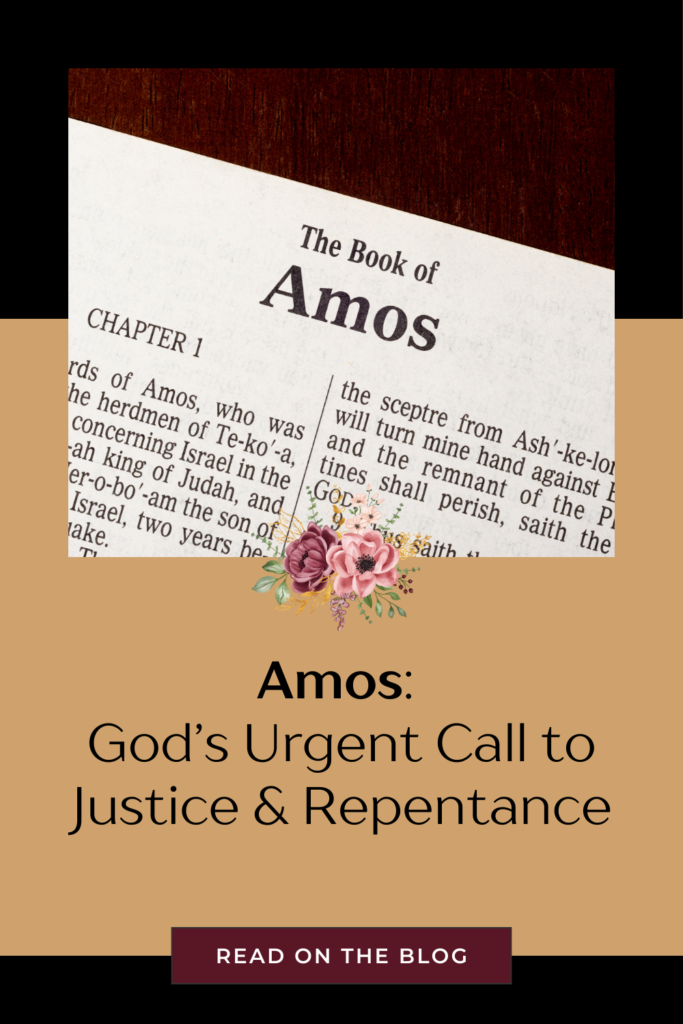The Book of Amos is one of the twelve minor prophets in the Old Testament. While it is a relatively short book, it carries a powerful message about God’s justice, the importance of righteous living, and His call for repentance. God called Amos, a shepherd and farmer, to speak against the social injustice and spiritual corruption in Israel. Through his prophecies, we see God’s desire for justice and His heart for the oppressed. We also see His call to turn away from sin and seek Him. In this post, we’ll explore the key themes in Amos, its significance, and how the message points to Jesus Christ.
Background of Amos
Amos was a shepherd from the southern kingdom of Judah. He prophesied in the northern kingdom of Israel around 760 B.C.. His ministry took place during a time of relative prosperity for Israel. But the wealth and success had led to widespread corruption and social inequality. The rich exploited the poor, and people performed religious rituals without true devotion to God. God called him to speak against these injustices and call Israel to repentance.
Amos uses strong language and vivid imagery to condemn sin, especially oppression, corruption, and empty religious rituals. Amos also offers hope, promising God will restore His people and establish justice and righteousness.
Where You Can See Jesus in Amos
In God’s Justice: The justice that Amos prophesies points to the ultimate justice that will be brought about through Jesus Christ. Jesus, as the perfect judge, will one day return to bring true justice to the earth (Matthew 25:31-46). His ministry also reflected God’s desire for justice, as He confronted the corrupt religious systems and spoke against the exploitation of the poor (Luke 4:18-19).
In the Call for Repentance: Amos called Israel to repentance. Jesus also called people to repent and turn to God. Jesus’ message was one of repentance and the forgiveness of sins (Mark 1:15, Luke 13:3). Through Jesus, we have the ultimate opportunity for repentance and reconciliation with God, as He offers forgiveness for all who turn to Him.
In the Day of the Lord: Amos speaks of the “Day of the Lord,” pointing to the final judgment, which Jesus will fulfill in His second coming. In the New Testament, Jesus is depicted as the one who will bring about the final judgment, separating the righteous from the wicked (Matthew 25:31-46). Jesus is both the judge and the one who offers grace and mercy to those who repent.
In God’s Heart for the Oppressed: Jesus’ ministry reflected God’s heart for the oppressed, as He reached out to the marginalized and vulnerable in society. He healed the sick, cared for the poor, and stood against the exploitation of the powerless. In the Gospels, Jesus shows that the kingdom of God is open to all. This is especially those who are oppressed (Matthew 11:28-30, Luke 4:18-19).
Key Themes in Amos
- God’s Justice: Amos emphasizes that God is a just God who will not allow sin to go unpunished. Justice will roll on like a river, and righteousness will flow from His throne. We are called to live justly and advocate for those who are oppressed and marginalized in society.
- The Call to Repentance: Jesus echoes Amos’ call for repentance through His message of repentance and forgiveness in the New Testament. True repentance involves a change of heart and a return to a right relationship with God. We are reminded to examine our hearts, turn from sin, and seek God’s forgiveness.
- The Day of the Lord: The Day of the Lord refers to a time of judgment, but also a time of restoration. Jesus will return to bring justice and establish His kingdom of righteousness. We live in light of this coming day, striving to live according to God’s will.
- God’s Heart for the Oppressed: Amos reveals God’s heart for the oppressed, and Jesus’ ministry demonstrated this same heart. We are called to care for the poor, the marginalized, and the oppressed, and to live justly in our communities.
How We Can Apply Amos to Our Lives Today
- Live Justly: God condemns the injustice in Israel, and we are called to live justly and advocate for the oppressed in our own society. Standing up for the marginalized, speaking out against injustice, and ensuring our actions reflect God’s heart for fairness and righteousness may be involved.
- Repent and Seek God: The call to repentance in Amos is just as relevant today. We are all called to turn away from sin and seek a right relationship with God. True repentance is not just about outward actions, but about a change of heart that leads to transformed living. As we reflect on Amos’ message, let us ask God to help us live in a way that honors Him.
- Wait for the Day of the Lord: The Day of the Lord reminds us that God will one day bring justice and righteousness to the earth. As we await this day, let us live in light of His coming, striving to live lives that reflect His justice, mercy, and love.
- Care for the Oppressed: Like God’s heart for the oppressed in Amos, we are called to care for the marginalized in our society. This may involve serving the poor, helping those in need, and standing up for those who cannot defend themselves. As followers of Jesus, we must live out His love and compassion for the vulnerable.
Conclusion
The Book of Amos challenges us to live lives of justice, righteousness, and repentance. It calls us to examine our hearts, turn away from sin, and live in a way that honors God. Amos also points forward to Jesus, who is the ultimate fulfillment of God’s justice and mercy. Through Jesus, we have the opportunity to experience repentance, forgiveness, and restoration. As we read Amos, let us reflect on how we can live justly, care for the oppressed, and wait expectantly for the return of our righteous Judge.
Call to Action
How has the message of Amos impacted you? In what ways can you live justly and advocate for the oppressed in your community? Share your thoughts in the comments below, and let’s continue to reflect on how we can apply God’s call to justice and repentance in our lives today.






